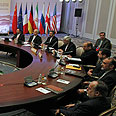
'Iran and six world powers are negotiating an issue critical to all Mideast countries'
צילום: AP
The empty chair
Op-ed: Israel must claim its place around every negotiating table debating fate of our region
The crisis between Israel and the United States is not just the result of the deal taking shape with Iran; it's the direct outcome of the political strategy formed by Israel in recent years.
Israel sought to turn the Iranian nuclear issue into an international issue on the table of the world's major powers. We demanded international leadership, we demanded international sanctions, we demanded that the powers take responsibility and wage a war against Iran around the negotiating table, and if all hope is gone – in the battlefield too.
We wanted the enlightened and responsible world to be willing to invest resources and sacrifice human life to achieve the goal. The world accepted our demand and took leadership. So far we succeeded.
We thought that we would not only be able to bring the world to action, but also to maintain the ability – and some would say, the authority – to supervise the powers' activity and rule whether they are doing it properly, and if necessary – intervene in the middle in order to fix what needs fixing. We succeeded here and there, but as we approach the last straight we are encountering a very complicated situation, created on our behalf.
Prime Minister Netanyahu has declared in front of the entire world that the deal taking shape is a historic mistake. Israel will not be committed to it, he warned. Israel is not committed to the deal not because it is good or bad – but because Israel decided in advance that it will not claim its place around the negotiating table. Israel placed its fate in the negotiations it defined as relating to an "existential" matter in the hands of a custodian, who it assumed would act according to its orders.
In the situation created, Iran and six world powers are is negotiating an issue which is critical to all countries in the Middle East – in the absence of those countries. None of the countries is invited, none of the countries is present, and none of the countries is committed to the results. This is a recipe for a series of endless conflicts between the United States and the region's countries.
There are no free meals
Now, as the negotiations between Iran and the world powers are progressing, the Americans are withdrawing their objection to Iran officially joining the group of countries slated to debate and decide on Syria's fate. Israel shares a border with Syria, but it won't be found at the table of negotiations over the future of the regime in Damascus, while Iran – which does not share a border with Syria but whose forces operate in Syria openly – will join the distinguished group Israel has excluded itself from.
It's safe to assume that Israel will expect the US to take care of its interests here too, and will be in for a disappointment here too.
Israel and the US have a unique relationship and we must not give up on it. But "there are no free meals," and it's time for Israel to claim its place at the tables where issues touching on its fate are being discussed, in one way or another. If, as the prime minister said, only Israel is responsible for its fate, it must implement this responsibility next to the diplomatic table and not just in the battlefield.
This week the prime minister is heading to Moscow, which supplies nearly tie-breaking weapons to Iran and Syria. He hopes that President Putin will help sabotage what he sees as President Obama's race into Iran's arms.
At the same time, Israel's friends in the American Senate – even those in the Republican camp – are standing behind the former senator, Secretary of State John Kerry. At the moment, Netanyahu's effort to cause the American public's representatives to rebel against the president appears unsuccessful. What does the prime minister hope to achieve in Moscow, and what is the price he's willing to pay for it?
And what about an emergency visit or an urgent appeal to China? After all, that's the country which supplied Iran with the reprocessing facility in Isfahan, without which the Iranians could not have reached the verge of the ability we seek to prevent. China is also a significant supplier of missiles to Iran. What is the intent of Netanyahu's perfect silence when it comes to this country?
Israel must claim its place around every table debating the fate of our region. It must aim for a situation in which Iran will have no other choice but to face Israel on the diplomatic level. If Israel is always left outside the room, it will remain with just one alternative to achieve its goals. Is that what it has been striving for to begin with? Must the sword devour forever?
Efraim Halevy is a former Mossad director










